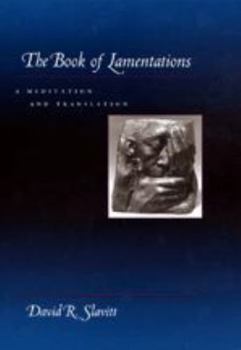The Book of Lamentations: A Meditation and Translation
Distinguished poet and translator David R. Slavitt here provides a translation of and meditation upon the Book of Lamentations, the biblical account of the destruction of the Temple in Jerusalem in 587 B.C., on the ninth day of the Jewish month of Av--Tish'a b'Av. (Six centuries later the Romans destroyed the second Temple on the same day.) Most of the Jewish population was deported to Babylon, and the ensuing period came to be known as the Babylonian...
Format:Paperback
Language:English
ISBN:0801866170
ISBN13:9780801866173
Release Date:June 2001
Publisher:Johns Hopkins University Press
Length:104 Pages
Weight:0.15 lbs.
Dimensions:0.4" x 5.5" x 8.5"
Customer Reviews
3 ratings
A Fine Book
Published by Thriftbooks.com User , 15 years ago
The book is divided into two parts: a meditation on the history of the Jews, and a new translation of the Book of Lamentations. Regarding the first half: I found it a well-written and fascinating essay. Slavitt covers a good deal of historical ground in about 60 pages, but does so with great lucidity, grace, and wit (much of it appropriately sardonic). It would be damning with faint praise to call this essay a primer on Jewish history, but it functioned as such for this reader, a gentile familiar with some but not all of the travails described on these pages. But if it is a primer (at least for readers like myself), it is also something more: it is, as advertised, a genuine meditation, that is to say, a real work of literature in which the author uses the events of history as a starting point for a deeper and more thoughtful analysis of that troubled relationship which exists between God and the Jews. Slavitt is a very good writer, and I found something worth underlining - some sentence or phrase that really struck me - on almost every page. For example, his observation on page 11 about the Temple and its eventual destruction: "It is as if the Temple were merely a preparation for the reality we now behold, that remnant, the Wailing Wall, a monument not only to God's glory but also to the brokenness of the world." The second half of the book is a new translation of the Book of Lamentations. I am an amateur in the field of biblical translation, and can only comment as such on the quality of Slavitt's work here: but I found this to be a fine, rich, and redolent text. Consider, for instance, this passage from the beginning verses of Lamentations 3: "Afflicted am I and beset, a man whom God in his wrath has abased. Abused by his rod and broken, I am driven into the darkness. Against me, he turned his hand, and again and again. Bones broken, wasted, I am besieged and battered. Bitterness is my portion and tribulation. Banished, I dwell in the darkest darkness like those who are long dead. Chained so I cannot escape and walled in, I am a captive. Crying for help, I call out, but he will not hear my prayer. Crooked are all my paths, which he has blocked with boulders." A final comment: I found this to be a first-rate example of contemporary book production, from the simple but beautiful cover art to the superb typesetting. In short, a book in which the quality of the writing is matched by the quality of design.
A Moving Meditation, and A Startling Translation
Published by Thriftbooks.com User , 16 years ago
This is a strange and powerful book. In an opening meditation, Slavitt links his personal experience of grief to the Book of Lamentations, broadens the scope of his narrative to encompass Jewish history and identity, and ties it all, pleasingly and complicatedly, to the new translation of the Book of Lamentations that is Part II. This translation brings to English some of the formal elements (notably the Hebrew equivalent of the abecedarium) that have been lost in earlier Hebrew-to-English renderings, and in so doing restores the hypnotic song of lament that means more deeply than those literal translations of words can approximate.
A meditation on catastrophe and history
Published by Thriftbooks.com User , 22 years ago
Slavitt's book is both a translation of the Biblical text and an extended meditation on Tish'a b'Av, the Jewish day commemorating a long series of losses and destructions. For those outside as well as within Jewish tradition, and interested in mourning and bereavement, this is fascinating material. It is beautifully written, and although it does not work as "consolation" literature, it places personal sorrows in a wider context. In the debate - within and outside Judaism - over whether the Holocaust was unique and if so, how, this book represents the negative stance. Jews had many many occasions of religious and historical catastrophe to cope with. This is a different point of view than, say, "Strange Fire: Reading the Bible After the Holocaust" edited by Linafelt, but both books are really worth delving into.





